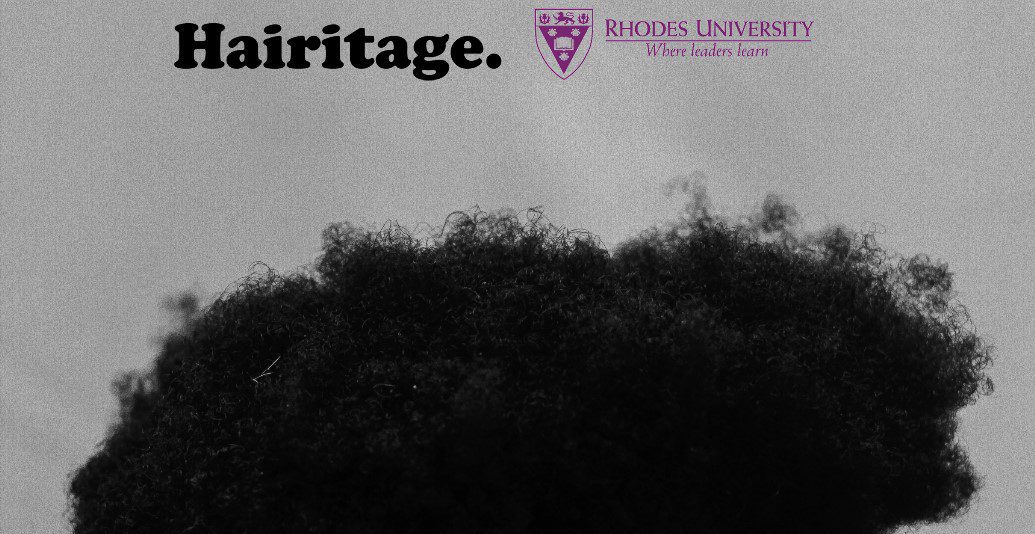By The Division of Communications & Advancement
In the vibrant tapestry of emerging artists, 26-year-old local artist Lithemba Nziweni stands out with a unique voice that connects deeply with his cultural roots and the broader socio-political context of the Global South. His ongoing photography series, Hairitage, has recently achieved an academic milestone by being integrated into the curriculum at Rhodes University. This marks a significant step in the recognition of his work and also reflects the University’s commitment to fostering academic discourse around art that emerges from the Global South. The inclusion of Hairitage in the Art History and Visual Culture module, specifically in the “Photography of the Global South” course, underscores both its artistic merit and its cultural resonance.
This achievement, while pivotal for Nziweni’s career, is also emblematic of Rhodes University’s continuing effort to celebrate diversity and recognise the significance of local narratives, especially in the context of the RU120 celebrations. As the University reflects on 120 years of academic and cultural contributions, the integration of Hairitage into its curriculum is a fitting reminder of the institution’s role in promoting art that speaks to contemporary issues and personal identity.
At the heart of the Hairitage series is a nuanced exploration of identity, culture, and history through the lens of hair as a symbol. In many African cultures, hair is more than a mere aesthetic or biological feature—it is a marker of identity, a reflection of social status, and a medium of cultural expression. Nziweni’s work captures the intricate relationships people have with their hair, particularly within the South African context, creating a powerful narrative around how hair can embody stories of resistance, pride, and survival.
Dr Lois Anguria, who teaches the “Photography of the Global South” module at Rhodes University, recognised the potential of Nziweni’s work to contribute meaningfully to academic discourse. Her decision to include Hairitage as a key focus in the module’s final essay was informed by her understanding of the series as a profound example of self-imaging within the Global South. The concept of self-imaging involves not just the act of capturing one’s physical likeness but also representing one’s cultural and ideological self through visual media. Nziweni’s subjects, primarily from the Eastern Cape, represent a microcosm of broader societal themes, which makes his work not only locally significant but globally relevant.
For students engaging with Hairitage in an academic setting, the series offers a platform for critical engagement with themes of decolonisation, identity politics, and representation. By studying this body of work, they are examining a visual narrative and also entering into a discourse about what it means to create art from the Global South. Dr Anguria’s decision to bring Hairitage into the academic fold is a testament to the work’s ability to bridge personal experience with wider global discussions about the politics of representation.
Despite the growing attention around Hairitage, there has been a notable absence of critical academic discourse that situates Nziweni’s work within a theoretical framework. As an emerging artist, Nziweni’s work may not have yet received the same level of critical scrutiny in relation to established theories of visual culture, postcolonialism, or identity representation and academic engagement that more established artists might get. The integration into Rhodes University’s curriculum offers a chance to foster that deeper academic discourse by positioning his work within a theoretical framework and encouraging critical analysis by students and scholars. The integration of Hairitage into the academic environment of Rhodes University presents an opportunity to rectify this.
The Hairitage series can be ideologically grounded in several key theories relevant to postcolonialism, identity, and the politics of representation. Scholars of visual culture, particularly those examining art from the Global South, have long argued that photography can serve as both a tool of colonial domination and a medium of resistance. Nziweni’s work speaks directly to this duality, using the visual language of photography to reclaim narratives about African identity that have historically been misrepresented or overlooked by Western visual culture.
In this sense, Hairitage documents personal stories and also participates in a larger conversation about the role of photography in shaping perceptions of the Global South. Its inclusion in Rhodes University’s academic curriculum ensures that students are simultaneously learning about the aesthetic and technical aspects of the series and also engaging with the political and ideological dimensions that it embodies. This critical discourse is crucial in positioning Nziweni’s work within the broader context of African visual culture and ensuring its long-term relevance in academic discussions.
The Eastern Cape has long been a fertile ground for cultural production, and Nziweni’s Hairitage series is a proud continuation of this tradition. By centering the work of a local artist in its academic discourse, Rhodes University is reaffirming its role as a cultural hub where local narratives are valued and celebrated. Moreover, this move aligns with the RU120 celebrations by showcasing how the university is actively contributing to the intellectual and cultural fabric of the region.
Reflecting on his journey with the University, Nziweni had this to say: “I’ve done a considerable amount of photography and video production work with the institution. Over time, as I’ve been creating here, my work has gained attention from both the University and its students. I’ve also collaborated closely with some of the University’s students on my personal photography and film projects, which I believe has led to increased recognition and interest from the institution as a whole.”
Lithemba Nziweni’s Hairitage series marks a significant moment in the ongoing dialogue about identity, culture, and representation in the Global South. Its inclusion in the academic curriculum at Rhodes University is a testament to its artistic and ideological significance, offering students an opportunity to engage critically with themes that resonate far beyond the Eastern Cape.
This article was first published by the Rhodes University Communication Division.


